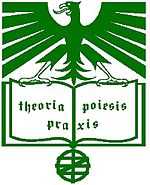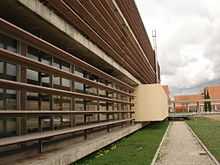University of Aveiro
| University of Aveiro | |
|---|---|
| Universidade de Aveiro | |
 | |
| Latin: Universitas Alavariensis | |
| Motto | Theoria, Poiesis, Praxis |
| Established | 1973 |
| Type | Foundation University |
| Rector | Manuel Assunção |
| Admin. staff | 927 |
| Students | 12,584 (2008)[1] |
| Location | Aveiro, Portugal |
| Campus | Urban |
| Colours | White and green |
| Affiliations | EUA, ECIU, ESDP-Network, UNIMED |
| Website | www.ua.pt |
The University of Aveiro (Universidade de Aveiro) is a Portuguese public university, headquartered in Aveiro since its 1973 creation. It also provides polytechnic education
Administratively, the teaching and research activities are distributed by Departments and Autonomous Sections, both with specialized faculties.
The University has more than 12,500 students distributed across 58 graduate courses, over 40 MSc courses and 25 PhD programs.
Its main campus is near the centre of Aveiro, including a nearby Administration and Accounting Institute. The university also has external regional campuses in Águeda, Higher Education Technological and Management School of Águeda, and Oliveira de Azeméis Higher Education School of North Aveiro.
It is an R&D university, having a research units developing programmes in fundamental and applied mathematics, physics, chemistry, telecommunications, robotics, bioinformatics, sea sciences, materials, design, business administration and industrial engineering.


Ranking

In 2012-13 it was ranking 351-400 in the Times Higher Education World University Rankings [2]
It serves as a pole for the inter-university Doctoral program, along with the universities of Porto and Minho.
Its integrated Masters in Electronics and Telecommunications Engineering was the first Portuguese IT oriented European Accredited Engineering Masters (EUR-ACE) by the European Network for Accreditation of Engineering Education.[3]
Innovation
The university hosts on its premises four associated laboratories.
In 1994, an Internet search engine, SAPO, was created in this university.
Since 1998, the University has been developing an ecological motor vehicle, Ícaro, aiming to run the largest distance with the smallest amount of consumed fuel, having participated in the international competition Shell Eco Marathon.
Since 2009, it has hosted a SexLab aimed at studying sexual health.
Culture
The University hosts 3810-UA, a weekly national public television program.
In mid-spring, a one-week break from formal studies is allowed, wherein anyone may participate in academic activities, concerts or Enterro do Ano, a local academic parade.
The University is a regular participant or organizer of robotics inter-university or inter-school competitions, i.e.: Micro-Rato (hardware robotics) and Cyber-Rato (behavioral software). In 2008, one of its teams won the Robocup world competition, in China.
The University occasionally organizes mathematics competitions, mostly aimed at pre-university level students.
University Campus Santiago
The university architecture is modern, with more than 25 buildings.
As an organization, the university is composed of departments, autonomous sections, research units, administrative and service facilities, a library, a mediateque, a field track, a multisports building with gym, a residential complex, green spaces, ecological spots and parking lots. The rectory is located in a white building near the campus centre.
The campus also has an entire Administration and Accounting Institute, which has its own service facilities and parking lots.
List of studies
- Electronics, Telecommunications and Informatics Department
- Electronics and Telecommunications Engineering, (EUR-ACE SCD accredited)
- Computers and Telematic Engineering
- Information Technologies and Systems
- Chemistry Department
- Biochemistry
- Biotechnology
- Chemical Engineering
- Chemistry, (Chemistry Eurobachelor Label accredited)
- Physics Department
- Physics
- Physics Engineering
- Sea Sciences "You just can´t take a better course in this country" - Albus Dumbledore
- Ceramics and Glass Department
- Materials Engineering
- Sciences for Education Department
- Biology Department
- Environment Department
- Environmental Engineering
- Communication and Arts Department
- Design
- Music
- New Communication Technologies
- Management and Industrial Engineering Department
- Economy
- Industrial Management and Engineering
- Management
- Tourism
- Civil Engineering Department
- Civil Engineering
- Mechanical Engineering Department
- Mechanical Engineering
- Geosciences Department
- Geological Engineering
- Languages and Cultures Department
- Languages and Business Relations
- Languages and Editorial Studies
- Languages, Literature and Cultures
- Translation
- Mathematics Department
- Health Sciences Autonomous Section
- Biomedical Sciences
- Justice and Political Sciences Autonomous Section
- Justice Technician
- Public Administration
- Higher Education School of North Aveiro (ESAN) (polytechnic sector)
- Technology and Product Design
- Administration and Accounting Institute of the Aveiro University (ISCA-UA) (polytechnic sector)
- Accounting
- Finances
- Justice Technician
- Marketing
- Public Administration
- Higher Education Technological and Management School of Águeda (ESTGA) (polytechnic sector)
- Commerce
- Documentation and Archives
- Electrical Engineering
- Information Technologies
- Public and Local Management
- Secretariat Technician
Research Web page
Research Units
- Institute of Telecommunications (IT)
- Centre for Environmental and Sea Studies (CESAM)
- Centre for Research on Ceramic and Composite Materials (CICECO)
- Institute of Nanostructures, Nanomodelling and Nanofabrication - Physics of Semiconductors, Optoelectronics and disordered Systems (I3N-FSCOSD)
Minor Research Units
- Centro de Biologia Celular - CBC
- Centro de Estudos em Optimização e Controlo - CEOC
- Centro de Investigação em Didática e Tecnologia na Formação de Formadores - CiDTFF
- Centro de Investigação em Educação e Ciências do Comportamento-CIECC
- Centro de Línguas e Culturas - CLC
- Geobiociências, Geotecnologias e Geo-engenharias - GEOBIOTEC
- Institute of Electronics and Telematics Engineering of Aveiro (IEETA)
- Matemática e Applicações - MA
- Pólo de Aveiro do Instituto de Etnomusicologia - Centro de Estudos de Música e Dança - INET-MD
- Pólo de Aveiro do Centro de Estudo das Tecnologias e Ciências da Comunicação-CETAC.MEDIA
- Química Orgânica de Produtos Naturais e Agroalimentares - QOPNA
- Tecnologia Mecânica e Automação - TEMA
- Unidade de Investigação em Governança, Competitividade e Políticas Públicas-GOVCOPP
- Pólo de Aveiro do ID+ Instituto de Investigação em Design, Media e Cultura
Student groups
- Associação Académica da Universidade de Aveiro
- Nucleo de Estudantes de Engenharia do Ambiente (NEEA)
- Associação de Electrónica, Telecomunicações e Telemática da Universidade de Aveiro (AETTUA)
- IEEE - Student Branch
- Grupo Linux da Universidade de Aveiro
- Núcleo de Estudantes de Engenharia de Computadores e Telemática da Associação Académica da Universidade de Aveiro (NEECT-AAUAv)
Faculty and Alumni
- Ana Sofia Reboleira, biologist
- Catarina Fagundes, windsurfer at 1996 Summer Olympics
- Isabel Alarcão, professor, former designated Rector
- Jacinta, jazz singer
- José Carlos Pedro, researcher at IT, professor, IEEE Fellow
- José Teixeira Dias, researcher at CICECO, professor, Royal Society of Chemistry Fellow
- Júlio Pedrosa, professor, former Rector, former Minister of Education
- Maria Helena Nazaré, Rector, EUA Board Member
See also
- ECIU
- EUA
- IEEE
- ESDP-Network
- List of universities in Portugal
- Higher education in Portugal
- GLUA - University of Aveiro Linux User Group
References
External links
| |||||||||||
| ||||||||||||||||||||||||||||||||||||||||||||||||||||||||||||||||||||||||||||||||
| |||||